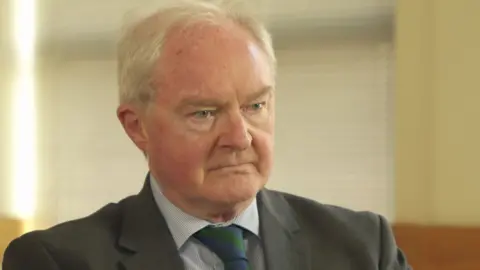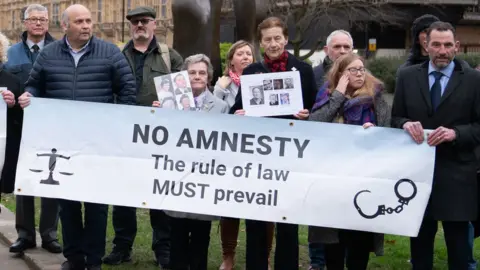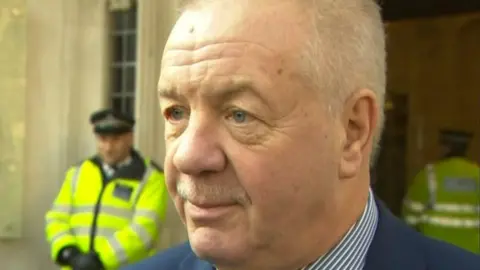Troubles legacy: Sir Declan Morgan hopes Dublin will back legacy body
 BBC
BBCThe retired judge who will lead the new Troubles legacy body has said he hopes the Irish government can be "persuaded" to support it.
Dublin has been strongly critical of the UK legacy plan, as have political parties and victims' groups.
Sir Declan Morgan is to become chief commissioner of the Independent Commission for Reconciliation and Information Recovery (ICRIR).
He told BBC News NI: "I don't contemplate this commission failing."
A spokesman for the Irish government told BBC News NI: "The UK Legacy Bill was drafted without consultation with the government of Ireland or the political parties in Northern Ireland.
"The government re-iterates its call on the secretary of state to pause the bill to enable a meaningful consultation with stakeholders and to ensure an ECHR [European Convention on Human Rights] compliant process."
The ICRIR, which will have a £250m budget and a staff of several hundred, will be established when the government's controversial legacy bill is passed at Westminster, probably by next month.
From next May, the ICRIR will take over hundreds of unresolved Troubles cases.
'I recognise concerns'
There has been widespread opposition among victims' groups and political parties to the fact immunity from prosecution will be on offer to perpetrators in return for information.
Sir Declan, who retired as lord chief justice of Northern Ireland in 2021, told BBC News NI: "I recognise there are concerns about the legislation.
"But it seems to me the way to address that is not by throwing up one's hands and saying 'well, you know, we can't do this'.
"The way to address that is to think through the strategy for how you will be able to deliver for the people who have been left behind on this issue."
He said legacy had been "a huge problem for a very long time" and one that was "too difficult to solve in 1998" - a reference to the Good Friday Agreement.
He acknowledged immunity for perpetrators is controversial and "how hurt" some families are by it, but points out the bill "is entirely a matter for politicians".
There have also been questions about the calibre of any investigations the ICRIR will decide to launch - it will have police powers - and whether they will satisfy human rights' obligations.
 PA Media/Stefan Rousseau
PA Media/Stefan RousseauSir Declan, 71, said he fully expected there to be legal challenges, with organisations such as the Council of Europe having questioned the legislation's compatibility with the European Convention of Human Rights.
Asked whether he believes the bill is lawful, he replied: "I am not going to express a view."
But he went on to state: "Everything the commission does, it seems to me, has to be compliant with the European Convention.
"It will be for the commission to device mechanisms to ensure so."
Sir Declan is faced with a challenge of winning over doubters and has begun a series of engagements to try to attract support.
"It may take time and it will certainly take time to build up the confidence of the people that I want to reach out to," he said.
"But my commitment to that is total."
'Wide conversation to be had'
The Irish government has long been opposed to the bill, previously arguing it would "undermine rather than assist reconciliation".
Sir Declan said: "There is a wide conversation to be had about reconciliation.
"I will certainly be seeking to achieve an outcome which ensures that relevant information is provided to us by agreement by the Irish government.
"There is a great deal of information that they may be able to shed in relation to events that have occurred.
"I have no indication the Irish government will respond.
"I hope if they are persuaded that this is a process which is going to contribute to fairness and to reconciliation, they will be persuaded that they should participate in it."
In a statement, the Irish Department for Foreign Affairs said: "The government's view is that any way forward on legacy must be based on agreed human rights standards, with victims at its centre."
It added that its "preferred way forward" would be the implementation of the legacy arrangements agreed by the two governments with Northern Ireland political parties in the 2014 Stormont House Agreement, which it said were "endorsed again in the Fresh Start and New Decade New Approach agreements".

Victims' campaigner Raymond McCord said Sir Declan should "step back from his appointment".
He added: "Bringing Sir Declan into the bill won't give it the credibility the government needs and desires.
"Criticism of Sir Declan from victims is understandable as he was seen as a friend of victims regarding inquests."
